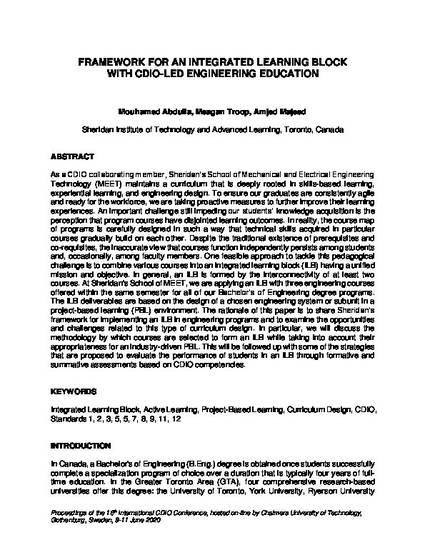
Presentation
Framework for an Integrated Learning Block with CDIO-led Engineering Education
Proc. of the 16th International CDIO Conference (CDIO'20)
(2020)
Abstract
As a CDIO collaborating member, Sheridan’s School of Mechanical and Electrical Engineering Technology (MEET) maintains a curriculum that is deeply rooted in skills-based learning, experiential learning, and engineering design. In an effort to ensure our graduates are consistently agile and ready for the workforce, we are taking proactive measures to further improve their learning experiences. An important challenge still impeding our students’ knowledge acquisition is the perception that program courses have disjointed learning outcomes. In reality, the course map of programs is carefully designed in such a way that technical skills acquired in particular courses gradually build on each other. Despite the traditional existence of prerequisites and co-requisites, the inaccurate view that courses function independently persists among students and, occasionally, among faculty members. One feasible approach to tackle this pedagogical challenge is to combine various courses into an integrated learning block (ILB) having a unified mission and objective. In general, an ILB is formed by the interconnectivity of at least two courses. At Sheridan's School of MEET, we are applying an ILB with three engineering courses offered within the same semester for all of our Bachelor’s of Engineering degree programs. The ILB deliverables are based on the design of a chosen engineering system or subunit in a project-based learning (PBL) environment. The rationale of this paper is to share Sheridan’s framework for implementing an ILB in engineering programs and to examine the opportunities and challenges related to this type of curriculum design. In particular, we will discuss the methodology by which courses are selected to form an ILB while taking into account their appropriateness for an industry-driven PBL. This will be followed up with some of the strategies that are proposed to evaluate the performance of students in an ILB through formative and summative assessments based on CDIO competencies.
Keywords
- Education,
- Engineering Education,
- Engineering School,
- Pedagogy,
- Curriculum Development,
- Teaching and Learning,
- Course Design,
- Course Development,
- Canadian Engineering Education,
- Educational Projects,
- CDIO,
- Applied Learning,
- Design,
- Engineering Design,
- Integrated Learning Block,
- Active Learning,
- Project-Based Learning,
- Curriculum Design
Disciplines
Publication Date
Summer June 8, 2020
Location
Gothenburg, Sweden (hosted on-line by Chalmers University of Technology)
DOI
ISBN: 978-91-88041-28-9
Comments
* Remark: The conference was originally planned to be hosted at Chulalongkorn University and Rajamangala University of Technology Thanyaburi, Bangkok, Thailand. The conference in Bangkok was postponed due to the COVID-19 pandemic. The 17th International CDIO Conference is expected in Thailand in 2021.
Citation Information
M. Abdulla, M. Troop and A. Majeed, "Framework for an Integrated Learning Block with CDIO-led Engineering Education," In Proc. of the 16th International CDIO Conference (CDIO'20), vol. 2, pp. 150-159, hosted on-line by Chalmers University of Technology, Gothenburg, Sweden, Jun. 8-10, 2020.
Link: https://research.chalmers.se/publication/519263 -- Program: http://cdio.org/content/framework-integrated-learning-block-cdio-led-engineering-education -- Video Presentation: https://youtu.be/sDh3O_IvzDk
Creative Commons License

This work is licensed under a Creative Commons CC_BY-NC-ND International License.
